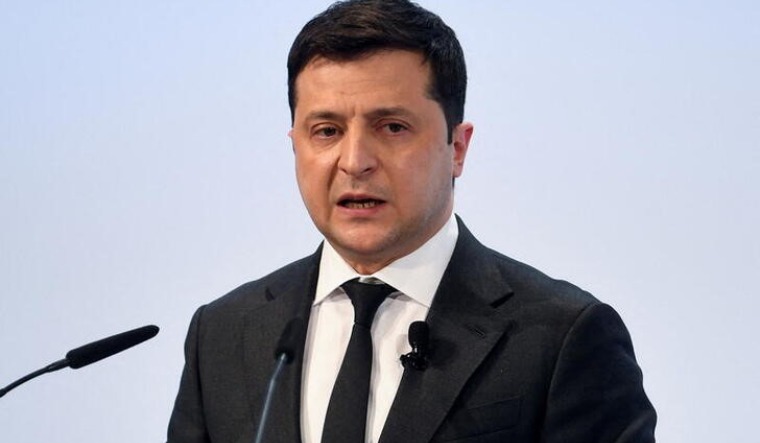Ukrainian President Volodymyr Zelenskyy is scheduled to address the United Nations Security Council on Tuesday, the first time he will address the most powerful UN organ since Russia's invasion of his country and after streets strewn with corpses of what appeared to be civilians were found in the suburbs of Kyiv, sparking worldwide horror and condemnation.
The UK is the President of the Security Council for the month of April and it announced in a tweet on Monday that Zelenskyy will virtually address Tuesday's Security Council meeting on Ukraine following his visit to the Kyiv suburb of Bucha.
This will be the first time that Zelenskyy addresses the Security Council since Russia's February 24 invasion of Ukraine.
Russia is a veto-wielding permanent member of the Council.
The Council and the General Assembly have held several meetings, including a rare Emergency Special Session in the 193-member Assembly on the situation in Ukraine.
"The UK Presidency of the Council will ensure the truth is heard about Russia's war crimes. We will expose (Russian President Vladimir) Putin's war for what it really is," the UK Mission to the UN said.
Images and videos of people lying dead on the streets of Bucha, some with their hands tied behind them, drew global condemnation and calls for investigation and tougher actions against Russia.
UN Secretary-General Antonio Guterres said he is "deeply shocked" by the images of civilians killed in Bucha.
"It is essential that an independent investigation leads to effective accountability," he said.
UN High Commissioner for Human Rights Michelle Bachelet said that she is "horrified" by the images of civilians lying dead on the streets and in improvised graves in the town of Bucha in Ukraine.
"Reports emerging from this and other areas raise serious and disturbing questions about possible war crimes as well as grave breaches of international humanitarian law and serious violations of international human rights law," she said, adding that it is essential that all bodies are exhumed and identified so that victims' families can be informed, and the exact causes of death established.
All measures should be taken to preserve evidence, Bachelet said.
"It is vital that all efforts are made to ensure there are independent and effective investigations into what happened in Bucha to ensure truth, justice and accountability, as well as reparations and remedy for victims and their families," she added.
US Ambassador at UN Linda Thomas-Greenfield told reporters in Bucharest, Romania that Washington, in close coordination with Ukraine, European countries and other partners at the UN, is going to seek Russia's suspension from the UN Human Rights Council.
"A hundred-and-forty UN Member States have already voted to condemn Russia over its unprovoked war and the humanitarian crisis it has unleashed upon the people of Ukraine.
"My message to those 140 countries who have courageously stood together is simple: the images out of Bucha and devastation across Ukraine require us now to match our words with action. We cannot let a Member State that is subverting every principle we hold dear to continue to sit on the UN Human Rights Council," Thomas-Greenfield said.
She was referring to the UN Member States who voted in favour of General Assembly resolutions deploring Russian action and demanding that Moscow immediately withdraw its forces and cease hostilities.
"Russia should not have a position of authority in that body, nor should we allow Russia to use their role on the Council as a tool of propaganda to suggest they have a legitimate concern about human rights.
"In fact, we see every day, including yesterday, heartbreaking reports about how little they care about human rights. Russia's participation on the Human Rights Council is a farce. It hurts the credibility of the Council and the UN writ large. And it is simply wrong. Which is why we believe it is time for the UN General Assembly to suspend them," she said.
Thomas-Greenfield told National Public Radio that the US expects action in the General Assembly "as soon as possible – this week, and possibly as early as Thursday." Russia's Permanent Representative to the UN, Ambassador Vassily Nebenzia, during a press briefing at the UN headquarters on the situation in Bucha, accused the Kiev regime, with active support from its Western sponsors, of promoting in Western mass media ''fake news" about alleged "atrocities" of Russian military forces.
"From the very beginning, it has been clear that this is nothing else but yet another staged provocation aimed at discrediting and dehumanising the Russian military and levelling political pressure on Russia.
"Not many of you know about the Russian military, but I assure you that the Russian military is nothing that it is being accused of, in particular what regards 'cruel atrocities' against the civilian population. It is not the case. It never was, and will never be," he said.
The Russian envoy asserted that Moscow has "factual evidence" to prove this point and it intends to present it to the Security Council as soon as possible "so that the international community is not misled by the false narrative promoted by Kiev and its Western sponsors." He said that there are no reports of atrocities which are accredited to the Russian military in Bucha, which happened before the Ukrainian army took control of the town.
"Four days after the Russian military left the city of Bucha, there was not a single sign of any 'atrocities'. I repeat – not a single reference to it, anywhere," Nebenzia said.
''The infamous video depicting bodies on the city roads only appeared on April 3. It is full of discrepancies and blatant lies. According to its authors, the bodies were lying on the streets for at least four days by the time the video was filmed.
"However, the bodies are not stiffened. How is that possible? It is against the law of biology. The bodies do not have signs of decomposition known to forensic experts, including cadaver stains. The wounds contain no blood,'' the Russian ambassador added.




